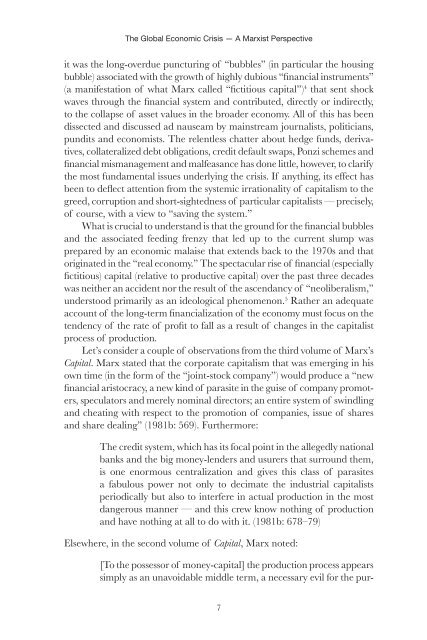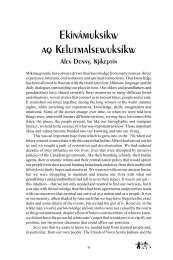The Global Economic Crisis — A Marxist Perspective - Fernwood ...
The Global Economic Crisis — A Marxist Perspective - Fernwood ...
The Global Economic Crisis — A Marxist Perspective - Fernwood ...
Create successful ePaper yourself
Turn your PDF publications into a flip-book with our unique Google optimized e-Paper software.
<strong>The</strong> <strong>Global</strong> <strong>Economic</strong> <strong>Crisis</strong> <strong>—</strong> A <strong>Marxist</strong> <strong>Perspective</strong><br />
it was the long-overdue puncturing of “bubbles” (in particular the housing<br />
bubble) associated with the growth of highly dubious “financial instruments”<br />
(a manifestation of what Marx called “fictitious capital”) 4 that sent shock<br />
waves through the financial system and contributed, directly or indirectly,<br />
to the collapse of asset values in the broader economy. All of this has been<br />
dissected and discussed ad nauseam by mainstream journalists, politicians,<br />
pundits and economists. <strong>The</strong> relentless chatter about hedge funds, derivatives,<br />
collateralized debt obligations, credit default swaps, Ponzi schemes and<br />
financial mismanagement and malfeasance has done little, however, to clarify<br />
the most fundamental issues underlying the crisis. If anything, its effect has<br />
been to deflect attention from the systemic irrationality of capitalism to the<br />
greed, corruption and short-sightedness of particular capitalists <strong>—</strong> precisely,<br />
of course, with a view to “saving the system.”<br />
What is crucial to understand is that the ground for the financial bubbles<br />
and the associated feeding frenzy that led up to the current slump was<br />
prepared by an economic malaise that extends back to the 1970s and that<br />
originated in the “real economy.” <strong>The</strong> spectacular rise of financial (especially<br />
fictitious) capital (relative to productive capital) over the past three decades<br />
was neither an accident nor the result of the ascendancy of “neoliberalism,”<br />
understood primarily as an ideological phenomenon. 5 Rather an adequate<br />
account of the long-term financialization of the economy must focus on the<br />
tendency of the rate of profit to fall as a result of changes in the capitalist<br />
process of production.<br />
Let’s consider a couple of observations from the third volume of Marx’s<br />
Capital. Marx stated that the corporate capitalism that was emerging in his<br />
own time (in the form of the “joint-stock company”) would produce a “new<br />
financial aristocracy, a new kind of parasite in the guise of company promoters,<br />
speculators and merely nominal directors; an entire system of swindling<br />
and cheating with respect to the promotion of companies, issue of shares<br />
and share dealing” (1981b: 569). Furthermore:<br />
<strong>The</strong> credit system, which has its focal point in the allegedly national<br />
banks and the big money-lenders and usurers that surround them,<br />
is one enormous centralization and gives this class of parasites<br />
a fabulous power not only to decimate the industrial capitalists<br />
periodically but also to interfere in actual production in the most<br />
dangerous manner <strong>—</strong> and this crew know nothing of production<br />
and have nothing at all to do with it. (1981b: 678–79)<br />
Elsewhere, in the second volume of Capital, Marx noted:<br />
[To the possessor of money-capital] the production process appears<br />
simply as an unavoidable middle term, a necessary evil for the pur-<br />
7





